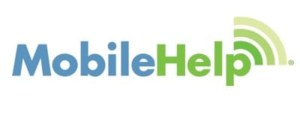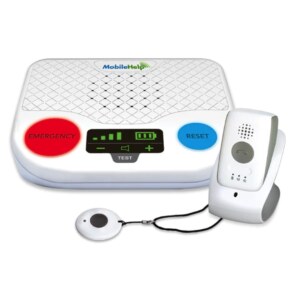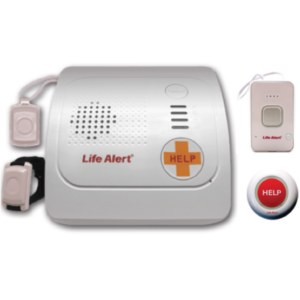MobileHelp Vs. Life Alert Comparison
AgingInPlace.org keeps our resources free by working as an affiliate partner with some companies mentioned on our site. These partnerships or the commission we may earn do not affect our opinions or evaluations of the products we mention. Our reviews are solely based on our research methodology and from input from our AgingInPlace.org Advisory Board. Learn more about our ad policies.
MobileHelp Vs. Life Alert Comparison
Products carousel
Having the ability to maintain your independence while still feeling safe can significantly impact your overall health and well-being. It can also provide peace of mind for your caregivers and family. One way to make this a reality is to use a medical alert system called a personal emergency response system (PERS).
Medical alert systems come with a wearable device that allows you to connect with a staffed monitoring center or loved one with a simple press of a button. Depending on the system and plan, you will have coverage at home and on the go.
While finding the right medical alert system to meet your budget and needs can feel daunting, narrowing down the choices can help. The following side-by-side comparison of two popular systems–MobileHelp vs. Life Alert–can help you do just that. Keep reading to discover the pros, cons, costs and features of MobileHelp vs. Life Alert.

Key Takeaways
- MobileHelp and Life Alert both offer in-home and mobile medical alert systems that use a wearable help button to alert the response center in case of an emergency.
- Life Alert requires a strict three-year contract. MobileHelp allows you to pay as you go month-to-month.
- The monthly fees associated with Life Alert are significantly higher than MobileHelp.
- Not all medical alert devices come with automatic fall detection. If this is one of your requirements, consider comparing MobileHelp to another medical alert company. Life Alert does not have fall detection available for any of its devices. MobileHelp does offer a fall detection button with several plans.
Overview of the MobileHelp vs. Life Alert
MobileHelp and Life Alert are two medical alert companies that offer in-home and mobile medical alert systems with wearable help buttons. Because the help button allows you to connect directly to a call center, these devices are considered monitored medical alert systems. This means they require a monthly fee to connect to a response center operator who can assist you in determining if a call to emergency services is needed, or if a loved one or family member can help instead.
While the two companies have some key elements in common, they also have several differences that are critical to consider when choosing the best medical alert system for your needs.
MobileHelp vs. Life Alert Comparison
| Side-by-Side Comparison | MobileHelp | Life Alert |
|---|---|---|
| Cost | ||
| Monthly Cost | Monthly costs of $19.95-$49.95, depending on the system; does not include add-on services | Monthly cost of $49.95-$89.95, depending on the system; does not include add-on services |
| Upfront And Activation Fees | Three plans require a processing fee if you choose the monthly plan: Classic-$49.95 Touch-$99.95 Touch Duo-$99.95 | One-time activation fee can range from $96-$198, depending on plan |
| Contract | No contract; service is month-to-month; monthly fees are lower if prepaying for 3, 6, 9 or 12 months | 3-year contract |
| Add-On Services | Fall detection $10/month Additional help buttons $2/month Wall help button $2/month Waterproof wall button $2.95/month MDLive $9.95/month Connect Premium $5/month Medication reminders $5/month | Wall-mounted help button $19.95/month Spouse monitoring $5/month |
| Features | ||
| Connection | Landline or cellular | Landline or cellularYes, $19.95/month, waterproof |
| Wall Mount Buttons | Yes, $2.95/month, waterproof | Yes, $19.95/month, waterproof |
| 2-Way Communication | Yes, mobile/GPS device and base station | Yes |
| Battery Life | Mobile devices, 24 hours; base station, 30-hour backup; neck pendant and wrist button, 5 years | Up to 10 years; 72-hour backup for base unit |
| Water Resistance Yes Yes | Yes | Yes |
| Automatic Fall Detection | Yes, add-on option for $10/month | No |
| GPS Locator Yes, with mobile/cellular-based plans | Yes, with mobile/cellular-based plans | Yes, with help on the go + 14 |
| Call Center Locations And Hours | 24/7 call center hours; U.S.-based monitoring, with call centers in New York and California | 24/7 call center hours; U.S.-based monitoring |
| Optional Features | ||
| Lockboxes | Yes, free with any plan | Yes |
| Extra Wearable Buttons | Yes $2/month each | Yes, price varies |
| Spouse Monitoring Device | Yes, with MobileHelp Duo System | Yes, $10/month |
| Side-by-Side Comparison | ||||||||||||||||||||||||||||||||||||||||||||||||||||||||||||||||||||||||||||||||||||||||||||||||||||||||||||
| Cost | MobileHelp | Life Alert |
|---|
| Monthly Cost | MobileHelp | Monthly costs of $19.95-$49.95, depending on the system; does not include add-on services | Life Alert | Monthly cost of $49.95-$89.95, depending on the system; does not include add-on services |
|---|
| Upfront And Activation Fees | MobileHelp | Three plans require a processing fee if you choose the monthly plan: Classic-$49.95 Touch-$99.95 Touch Duo-$99.95 | Life Alert | One-time activation fee can range from $96-$198, depending on plan |
|---|
| Contract | MobileHelp | No contract; service is month-to-month; monthly fees are lower if prepaying for 3, 6, 9 or 12 months | Life Alert | 3-year contract |
|---|
| Add-On Services | MobileHelp | Fall detection $10/month Additional help buttons $2/month Wall help button $2/month Waterproof wall button $2.95/month MDLive $9.95/month Connect Premium $5/month Medication reminders $5/month | Life Alert | Wall-mounted help button $19.95/month Spouse monitoring $5/month |
|---|
| Features | MobileHelp | Life Alert |
|---|
| Connection | MobileHelp | Landline or cellular | Life Alert | Landline or cellularYes, $19.95/month, waterproof |
|---|
| Wall Mount Buttons | MobileHelp | Yes, $2.95/month, waterproof | Life Alert | Yes, $19.95/month, waterproof |
|---|
| 2-Way Communication | MobileHelp | Yes, mobile/GPS device and base station | Life Alert | Yes |
|---|
| Battery Life | MobileHelp | Mobile devices, 24 hours; base station, 30-hour backup; neck pendant and wrist button, 5 years | Life Alert | Up to 10 years; 72-hour backup for base unit |
|---|
| Water Resistance Yes Yes | MobileHelp | Yes | Life Alert | Yes |
|---|
| Automatic Fall Detection | MobileHelp | Yes, add-on option for $10/month | Life Alert | No |
|---|
| GPS Locator Yes, with mobile/cellular-based plans | MobileHelp | Yes, with mobile/cellular-based plans | Life Alert | Yes, with help on the go + 14 |
|---|
| Call Center Locations And Hours | MobileHelp | 24/7 call center hours; U.S.-based monitoring, with call centers in New York and California | Life Alert | 24/7 call center hours; U.S.-based monitoring |
|---|
| Optional Features | MobileHelp | Life Alert |
|---|
| Lockboxes | MobileHelp | Yes, free with any plan | Life Alert | Yes |
|---|
| Extra Wearable Buttons | MobileHelp | Yes $2/month each | Life Alert | Yes, price varies |
|---|
| Spouse Monitoring Device | MobileHelp | Yes, with MobileHelp Duo System | Life Alert | Yes, $10/month |
|---|
MobileHelp Overview
MobileHelp offers several medical alert systems at home and on the go. Although this company gets many things right with its systems, there are a few main reasons we suggest you consider purchasing a MobileHelp medical alert device.
Firstly, the company has some of the lowest monthly rates, with its basic plan starting at $19.95 per month. The devices also provide an in-home range of 1,400 feet, making this an excellent system for older adults who spend most of their time at home. Access to the MobileHelp Connect app, which provides notification and tracking for family members and caregivers, is another reason to consider MobileHelp.
More great news is that with so many medical alert plans to choose from, there’s a good chance you’ll find one that works for you. Here are some more key details and features of MobileHelp’s medical alert systems.
Pros
-
Comes with a 30-day risk-free trial
-
The in-home medical alert system has one of the best ranges of any system on the market.
-
Jewelry-style pendants are available to make help buttons appear more stylish.
-
Access to the Connect App, which provides notification and tracking for family and loved ones.
-
Touch device available for in-home coverage
Cons
-
Additional monthly fee for automatic fall detection
-
Some plans require an activation fee.
-
Extra features can make monthly fees pricey.
Different Plans and Models of MobileHelp
The Classic gives you all the protection you need while at home. This system comes with a base unit and a waterproof help button you can wear as a pendant or on your wrist. The base connects to the call center 24/7 via cellular service. The Classic has a 1,400-foot range from the base station, which is ideal for most apartments, condos, and homes. It’s also compatible with the MobileHelp Fall Button. MobileHelp Classic costs $19.95 per month plus a one-time processing fee of $49.95.
Wired Home is MobileHelp’s in-home landline system. It comes with the same features and operating instructions as the Classic, but instead of connecting to the monitoring center via cellular service, the base unit uses your landline to call for help. If you have poor cell service in your area, this is the plan for you. MobileHelp Wired Home costs $24.95 per month.
Touch Classic is an easy-to-use tablet and medical alert device that gives you access to 24/7 monitoring and two-way communication during an emergency. It also doubles as an interactive tablet that you can use for playing cognitive games, looking at pictures, and managing your medications. It is 4G LTE compatible and Wi-Fi and Bluetooth-enabled. The Touch comes with a pendant or wrist-style help wearable help button and costs $54.95 per month plus a one-time processing fee of $99.95.
MobileHelp Solo is a mobile alert system that provides coverage at home and on the go. This system includes a mobile unit and one waterproof help button you can wear around your neck on the wrist. In addition, the Solo pendant has GPS tracking for extra safety while away from home. It connects to the monitoring center via cellular connection while at home and on the go. No base unit or landline is required. It’s also compatible with the MobileHelp Fall Button. MobileHelp Micro Solo costs $37.95 per month.
This is MobileHelp’s smallest and lightest mobile help button. The Micro is a GPS-enabled device you can wear around your neck, or you can detach it from the lanyard and place it in a pocket or purse when you’re on the go. It weighs 1.8 ounces, so it’s ideal for seniors who want something discreet. The Micro also has voice guidance and high-quality speakers to help you communicate with the call center. MobileHelp Micro costs $33.95 per month.
The Duo is MobileHelp’s answer to comprehensive coverage. This system gives you access to emergency help at home and on the go by connecting to the monitoring center via the base station at home or mobile device and GPS-tracking unit when you’re away from home. The Duo comes with a pendant and wrist-style waterproof help button that works within a 1,400-foot range from the base station while the user is at home. It’s also compatible with the MobileHelp Fall Button. MobileHelp Duo costs $41.95 per month.
If you need coverage for two people, consider the MobileHelp Duo. The Duo provides protection at home and on the go with an in-home base unit and mobile unit with GPS tracking and a wearable neck pendant or wrist help button. This system provides services and buttons for two people at a discounted rate. MobileHelp Mobile Duo costs $44.95 per month.
The Touch Duo provides the same great features as the Touch Classic and adds a wearable pendant, mobile device, and charger you can use when on the go. This system provides 24/7 emergency monitoring directly from the home screen with soft key touch or the wearable help button. The Touch Duo costs $54.95 per month plus a one-time processing fee of $99.95.
See our full MobileHelp Medical Alert System Review.
Life Alert Overview

Life Alert is one of the oldest companies in the medical alert market, dating back to 1987. The company is based in Encino, California. Life Alert was one of only a few systems available for several years and continues to be a simple and popular choice for many older adults. Fortunately, the market is growing, and there are now several medical alert companies and systems available with more affordable prices, better systems, and fewer restrictions.
That being said, Life Alert is a decent system if you need a device and base station with excellent battery life or an easy-to-see waterproof, wall-mounted help button. Here are some more details about Life Alert medical alert devices.
Pros
-
Help button pendants are safe for use in the bathtub and shower.
-
Option to add a wall-mounted help button to the shower
-
Life Alert has a TMA Five Diamond Certification designation, which indicates that they maintain a high-quality call center.
Cons
-
Requires customers to sign a three-year service contract, while most other companies have a month-to-month option
-
Higher monthly fees compared to other medical alert systems
-
Pricing and plan options are not clear on the website. Potential customers need to call customer service for more information.
-
Automatic fall detection is not available.
Different Plans and Models of Life Alert
The Master Unit is the required system when using a Life Alert medical alert system. You can add other features like the help button and GPS + Mobile device to it. The Master Unit system plugs into the wall and has a large help button you can press to contact the call center. You can also use the wearable pendant or wrist-style help button with the system. When using the wearable help button, Life Alert advertises an 800-foot coverage range from the base station. The main unit comes with a choice of cellular or landline to connect with the emergency monitoring center. This system can range from $49.95-$89.95, depending on add-ons and if you’re approved to purchase the Master Unit on its own without a bundle package.
The Mobile System or help on the go + GPS is Life Alert’s answer to dealing with emergencies that occur away from home. This add-on unit comes with a small GPS-enabled help button you can wear or carry in a bag or pocket. You will be connected to the emergency monitoring center via cell service using the mobile Life Alert button. This is not a standalone system. You must purchase the Life Alert Master Unit in order to use the GPS-enabled device. If you bundle the Master Unit and Mobile + GPS, you will pay $69.90 per month.
The help button is a wall-mount device with two-way communication. You can mount the help button in the shower, bathtub wall, bedrooms or any other location in your house. In a medical emergency, simply press the large red help button to connect with a dispatcher. The Life Alert help button is an add-on service that is available for $19.95 per month.
See our full Life Alert Medical Alert System Review.
Similarities & Differences Between MobileHelp and Life Alert
When deciding on a medical alert system, it’s helpful to look at the similarities and differences between companies. While both MobileHelp and Life Alert provide access to a call center and emergency services, there are some key similarities and differences worth pointing out. Here are a few similarities and differences between MobileHelp and Life Alert.
Similarities:
- Both are monitored medical alert systems with base units that connect to a call center in case of any emergency.
- Both offer an in-home and mobile medical alert system.
- Both require a monthly service fee.
- Equipment is leased with both companies.
- Both offer wall-mounted help buttons for an additional fee.
- Both have waterproof pendants.
- The monitoring centers of both companies operate 24/7 and are U.S.-based.
Differences:
- Life Alert requires a long-term contract; Mobile Help does not.
- Life Alert does not have fall detection. MobileHelp offers automatic fall detection for $10 per month with certain systems.
- MobileHelp has transparent pricing on its website. Life Alert is vague and offers no easy access to plans or pricing.
- Life Alert requires an activation fee for all products. MobileHelp only has a one-time fee for a few systems.
- Life Alert has professional installation; MobileHelp does not.
- MobileHelp’s maximum in-home range is 1,400 feet. Life Alert is 800 feet.
What Customers Are Saying about Both Brands
Reading customer reviews is one of the best ways to get a good read on how a company responds to complaints and stands by its product. Before settling on a medical alert system, consider reviews from various sites like the Better Business Bureau (BBB), Trustpilot, Consumer Reports, Google reviews and Yelp. Most companies publish their reviews from customers, but you should always compare these to a site not affiliated with that medical alert system in order to get the most objective opinions.
What Customers Are Saying About MobileHelp
1/12/2022
“I ordered mobile help a medical alarm Monitoring company and there central dispatch did not respond to my pushing of the button for at least 10 plus minutes to a half an hour . I have a heart arrhythmia and time is of the essence. I asked to return there equipment and was promised a refund once they received there unit. Once they received there unit they wouldn’t refund me shipping even though it’s there system that does not work correctly I asked for a supervisor on multiple occasions and was refused. This is not a company that should be in business and in my opinion is an endangerment to someone’s life in an emergency.” BBB notes the company resolved this issue with the customer.
“As a family member requesting this for my father, the ordering process was easy and straightforward. Was able to choose the solution that best met our needs. When issues have arisen with the operation of the base unit and testing of devices, support has been readily available via phone to help guide through testing and resolving issues. Have not had to use the system for real, but response has been quick during tests.”
David Rice, Verified Customer (Review from Bestcompany.com)
“New user. So far, I am impressed with the features of my Mobile Help. I have the use of the basic unit plus the On The Go ability. My daughters feel that they don’t need to ” hover” over me as much. I like that Mobil Help has the button near my commode and shower for help.”
Joyce Guthrie, Verified Customer (Review from Bestcompany.com)
What Customers Are Saying About Life Alert
Life Alert complaints date back several years. However, if you go just by the information posted on the company’s website, customers are always happy because Life Alert fails to publish reviews that acknowledge any downsides of the product. Unfortunately, most of the reviews we read online were from customers complaining of unresolved issues, a poor customer service experience, or failure to have anyone from the company contact them regarding a product.
The BBB website currently lists a rating of 3.69 out of 5 for 186 customer reviews. Here are a few recent reviews on the BBB site.
1/10/2022
“The service left the customer, a 96 year old man, on the floor with no help. After an hour of the device telling him he would be connected to dispatch center, no one picked up at the dispatch center. He had to crawl on the floor to call 911 himself because dispatch never picked up his alert to send him rescue. Now, that I am trying to cancel the service due to their lack of service at this customer’s time of need, they are very uncooperative. They are out of line trying to accuse customer of providing false information. It is very frustrating to be treated as though I am making false claims after a very upsetting emergency.”
11/24/2021
“A couple of years ago, I signed my 86 year old mother up for Life Alert. The price seemed a little high and I did give into the Sales staff that basically made me feel that if I didn’t get it, I must not care for my mother. At the time I ordered it, I was gone a lot for work. Covid came and I became unemployed. Now we have someone with mom 24/7. I have tried explaining to them that this things have changed and we cannot afford the service. They will not let us break the 3 year contract. She is to the point that its either being able to afford medication or life alert service. They do not care about the customers well being, but rather the locked in contracts that they have. Every time we have contacted them they try and make us feel small and are very condescending to us.”
“I had chest pains and trouble breathing. The person stayed on the line and kept me calm until the police and ambulance got here.”
Barbara, verified customer (Review from Better Business Bureau)
“I called Life Alert twice to get some pricing as my mom just passed away, and I needed something for my dad. They hung up on me twice because I would not give them my full address. I just had 2 questions and they would not answer them for me- I was told they are in ‘the free brochure they will mail me.’ So ridiculous. They just lost a customer.”
Terry, verified customer (Review from Best Company)
Bottom Line
MobileHelp and Life Alert offer medical alert systems at home and on the go. While both companies provide medical alert monitoring services, we feel that MobileHelp is a clear winner when comparing the two systems. The company offers monthly plans with no contract, automatic fall detection, multiple systems and device options, affordable pricing and excellent customer service.
On the other hand, Life Alert requires a long-term contract that seems almost impossible to terminate. We also dislike the lack of transparency regarding monthly fees, activation costs, and add-on services. Also worthy of note: Our experience when calling the Life Alert customer service number for an informational brochure was not positive. The agents use aggressive sales tactics and refuse to answer simple questions, without even getting your contact information first. This reason alone makes us hesitant to recommend Life Alert.
Why You Can Trust Our Expert Review
You deserve the best products for a better quality of life. We strive to create honest, helpful reviews backed by firsthand shopping, testing, and research. Our content is medically reviewed and unbiased to help you choose the right medical alert system for you or your loved one.
From over 1,000 hours of research, we chose 11 of the top brands that we believe are the best medical alert systems. We did the following throughout our research process:
- Consulted with geriatricians and adult caregivers
- Mystery shopped the brands
- Surveyed medical alert system users
- Tested various medical alert systems
- Interviewed experts in the field
- Read hundreds of verified customer reviews from trusted third parties such as Better Business Bureau (BBB) and Trustpilot
Frequently Asked Questions
-
Yes, there are plenty of medical alert devices priced lower than Life Alert, and they don’t require a lengthy contract. If you want a high-quality, affordable medical alert device, consider looking at Medical Guardian, Aloe Care Health, or Bay Alarm Medical and MobileHelp.
-
Yes, MobileHelp is a legitimate company based in the United States. MobileHelp reviews are generally positive, and the company currently has an A+ rating from the Better Business Bureau (BBB).
-
Life Alert and Lifeline are not the same things. With that being said, Lifeline, like Life Alert, is a medical alert company. Philips Lifeline offers three medical alert systems, including plans that work at home and on the go. Philips Lifeline partners with the American Association of Retired Persons (AARP) to provide discounts on services to eligible AARP members.
-
MobileHelp connects to the monitoring center via AT&T cellular network when using a mobile system or an in-home system that uses a cellular connection instead of a landline. This mobile service is included with your monitoring plan.
-
Life Alert does not require a landline to connect the master unit to the emergency monitoring center. You have the choice between a cellular or landline connection. You will need to work with the customer service department to determine the best connection for your needs.
Pricing accurate as of April 14, 2022.
Our Comparisons of Medical Alert System
- Life Alert vs Medical Guardian
- Medical Alert vs Medical Guardian
- Lively vs Medical Alert
- Life Alert vs Medical Alert
- Medical Guardian vs Bay Alarm Medical
Other Medical Alert Systems That We Have Reviewed
- Medical Guardian Review
- MobileHelp Review
- Bay Alarm Medical Review
- Aloe Care Health Review
- LifeFone Review
- Life Alert Review
- GreatCall Lively Mobile Review
- Medical Alert Review
- GetSafe Review
- Philips Lifeline Review
- Rescue Alert Review
- ADT Medical Alert Review
- Alert1 Review
- UnaliWear Review
- MobileHelp Smart Watch Review
- Apple Watch Medical Alert Review
WRITTEN BY
Sara Lindberg is a freelance writer specializing in health, fitness, senior care and nutrition. With a master’s in education and bachelor’s in exercise science, she has worked as a personal trainer and group exercise specialist for older adults. Her work has appeared in several national print and media publications. In her own life, caring for a parent with health issues has allowed her to see firsthand how critical it is for seniors and their families to have accurate, compassionate, and relatable information as they make decisions about aging in place.
View AuthorDo you want to cite this page? Use our ready-made cite template.




